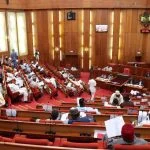An Upper Area Court sitting in Lokoja, Kogi State, has remanded one Elizabeth Abu in the custody of the Criminal Investigation Department of the Nigeria Police force till 22nd March, 2022.
Justice A.M Mopa, who presided over the case, said this will enable the police conclude investigation on abuse and maltreatment of the suspect’s stepson identified as David Mathew Ewongolu.
DAILY POST had earlier reported that Elizabeth Abu was arrested by the Kogi State Government after she was allegedly accused of burning her stepson with a hot pressing iron when one of her cloth was used to make a duster.
Addressing the court, Musa Saidat, representing the OC Legal and Prosecution, Nigeria Police Force, Kogi State Command, filed an ex parte application dated 15th March seeking the court to remand the suspect and to enable the police conclude investigation on abuse and maltreatment by Mrs Elizabeth Abu.
The prosecution counsel, while citing sections 291 and 292 of Criminal Justice Law 2017 supported her exparte order with a seven-paragraph affidavit.
Delivering his ruling, the trial judge granted the request of the prosecution that the suspect be remanded for 14 days in the CID facility.
Speaking with newsmen after the suspect was remanded, the Secretary to the Government of Kogi State, Dr. Mrs Folashade Ayoade Arike, described the abuse on David Mathew Ewongolu as callous and barbaric.
She promised to push for the signing into law of the Violence Against Prohibition Person’s Bill recently passed by the Assembly, assuring that when passed it will go a long way in reducing cases of sexual and other violence.
She disclosed that the State Government is interested in the matter, pointing out that Governor Yahaya Bello frowns at issues of violence and abuse.
Also speaking, Eunice Abimbola Agbogun, Executive Director, Challenge Parenthood Initiative, (CPI) who reported the issues of the abuse to the Police, that led to the arrest of the suspect, appealed for the signing into law the recently passed VAPP Bill, assuring that the law has the capacity to check and limit issues of sexual and other violence in the state.





2 Comments